- Home
- Herman Melville
Israel Potter. Fifty Years of Exile Page 16
Israel Potter. Fifty Years of Exile Read online
Page 16
Ere long, a horrible explosion was heard, drowning for the instant the cannonade. Two of the old eighteen-pounders-before spoken of, as having been hurriedly set up below the main deck of the Richard-burst all to pieces, killing the sailors who worked them, and shattering all that part of the hull, as if two exploded steam-boilers had shot out of its opposite sides. The effect was like the fall of the walls of a house.
Little now upheld the great tower of Pisa but a few naked crow stanchions. Thenceforth, not a few balls from the Serapis must have passed straight through the Richard without grazing her. It was like firing buck-shot through the ribs of a skeleton.
But, further forward, so deadly was the broadside from the heavy batteries of the Serapis-levelled point-blank, and right down the throat and bowels, as it were, of the Richard-that it cleared everything before it. The men on the Richard's covered gun-deck ran above, like miners from the fire-damp. Collecting on the forecastle, they continued to fight with grenades and muskets. The soldiers also were in the lofty tops, whence they kept up incessant volleys, cascading their fire down as pouring lava from cliffs.
The position of the men in the two ships was now exactly reversed. For while the Serapis was tearing the Richard all to pieces below deck, and had swept that covered part almost of the last man, the Richard's crowd of musketry had complete control of the upper deck of the Serapis, where it was almost impossible for man to remain unless as a corpse. Though in the beginning, the tops of the Serapis had not been unsupplied with marksmen, yet they had long since been cleared by the overmastering musketry of the Richard. Several, with leg or arm broken by a ball, had been seen going dimly downward from their giddy perch, like falling pigeons shot on the wing.
As busy swallows about barn-eaves and ridge-poles, some of the Richard's marksmen, quitting their tops, now went far out on their yard-arms, where they overhung the Serapis. From thence they dropped hand-grenades upon her decks, like apples, which growing in one field fall over the fence into another. Others of their band flung the same sour fruit into the open ports of the Serapis. A hail-storm of aerial combustion descended and slanted on the Serapis, while horizontal thunderbolts rolled crosswise through the subterranean vaults of the Richard. The belligerents were no longer, in the ordinary sense of things, an English ship and an American ship. It was a co-partnership and joint-stock combustion-company of both ships; yet divided, even in participation.
The two vessels were as two houses, through whose party-wall doors have been cut; one family (the Guelphs) occupying the whole lower story; another family (the Ghibelines) the whole upper story.
Meanwhile, determined Paul flew hither and thither like the meteoric corposant-ball, which shiftingly dances on the tips and verges of ships' rigging in storms. Wherever he went, he seemed to cast a pale light on all faces. Blacked and burnt, his Scotch bonnet was compressed to a gun-wad on his head. His Parisian coat, with its gold-laced sleeve laid aside, disclosed to the full the blue tattooing on his arm, which sometimes in fierce gestures streamed in the haze of the cannonade, cabalistically terrific as the charmed standard of Satan. Yet his frenzied manner was less a testimony of his internal commotion than intended to inspirit and madden his men, some of whom seeing him, in transports of intrepidity stripped themselves to their trowsers, exposing their naked bodies to the as naked shot The same was done on the Serapis, where several guns were seen surrounded by their buff crews as by fauns and satyrs.
At the beginning of the fray, before the ships interlocked, in the intervals of smoke which swept over the ships as mist over mountain-tops, affording open rents here and there-the gun-deck of the Serapis, at certain points, showed, congealed for the instant in all attitudes of dauntlessness, a gallery of marble statues-fighting gladiators.
Stooping low and intent, with one braced leg thrust behind, and one arm thrust forward, curling round towards the muzzle of the gun, there was seen the loader, performing his allotted part; on the other side of the carriage, in the same stooping posture, but with both hands holding his long black pole, pike-wise, ready for instant use-stood the eager _rammer and sponger_; while at the breech, crouched the wary _captain of the gun_, his keen eye, like the watching leopard's, burning along the range; and behind all, tall and erect, the Egyptian symbol of death, stood the _matchman_, immovable for the moment, his long-handled match reversed. Up to their two long death-dealing batteries, the trained men of the Serapis stood and toiled in mechanical magic of discipline. They tended those rows of guns, as Lowell girls the rows of looms in a cotton factory. The Parcae were not more methodical; Atropos not more fatal; the automaton chess-player not more irresponsible.
"Look, lad; I want a grenade, now, thrown down their main hatchway. I saw long piles of cartridges there. The powder monkeys have brought them up faster than they can be used. Take a bucket of combustibles, and let's hear from you presently."
These words were spoken by Paul to Israel. Israel did as ordered. In a few minutes, bucket in hand, begrimed with powder, sixty feet in air, he hung like Apollyon from the extreme tip of the yard over the fated abyss of the hatchway. As he looked down between the eddies of smoke into that slaughterous pit, it was like looking from the verge of a cataract down into the yeasty pool at its base. Watching, his chance, he dropped one grenade with such faultless precision, that, striking its mark, an explosion rent the Serapis like a volcano. The long row of heaped cartridges was ignited. The fire ran horizontally, like an express on a railway. More than twenty men were instantly killed: nearly forty wounded. This blow restored the chances of battle, before in favor of the Serapis.
But the drooping spirits of the English were suddenly revived, by an event which crowned the scene by an act on the part of one of the consorts of the Richard, the incredible atrocity of which has induced all humane minds to impute it rather to some incomprehensible mistake than to the malignant madness of the perpetrator.
The cautious approach and retreat of a consort of the Serapis, the Scarborough, before the moon rose, has already been mentioned. It is now to be related how that, when the moon was more than an hour high, a consort of the Richard, the Alliance, likewise approached and retreated.
This ship, commanded by a Frenchman, infamous in his own navy, and obnoxious in the service to which he at present belonged; this ship, foremost in insurgency to Paul hitherto, and which, for the most part, had crept like a poltroon from the fray; the Alliance now was at hand.
Seeing her, Paul deemed the battle at an end. But to his horror, the Alliance threw a broadside full into the stern of the Richard, without touching the Serapis. Paul called to her, for God's sake to forbear destroying the Richard. The reply was, a second, a third, a fourth broadside, striking the Richard ahead, astern, and amidships. One of the volleys killed several men and one officer. Meantime, like carpenters' augers, and the sea-worm called Remora, the guns of the Serapis were drilling away at the same doomed hull. After performing her nameless exploit, the Alliance sailed away, and did no more. She was like the great fire of London, breaking out on the heel of the great Plague. By this time, the Richard had so many shot-holes low down in her hull, that like a sieve she began to settle.
"Do you strike?" cried the English captain.
"I have not yet begun to fight," howled sinking Paul.
This summons and response were whirled on eddies of smoke and flame.
Both vessels were now on fire. The men of either knew hardly which to do; strive to destroy the enemy, or save themselves. In the midst of this, one hundred human beings, hitherto invisible strangers, were suddenly added to the rest. Five score English prisoners, till now confined in the Richard's hold, liberated in his consternation by the master at arms, burst up the hatchways. One of them, the captain of a letter of marque, captured by Paul, off the Scottish coast, crawled through a port, as a burglar through a window, from the one ship to the other, and reported affairs to the English captain.
While Paul and his lieutenants were confronting these prisoners, the gunner
, running up from below, and not perceiving his official superiors, and deeming them dead, believing himself now left sole surviving officer, ran to the tower of Pisa to haul down the colors. But they were already shot down and trailing in the water astern, like a sailor's towing shirt. Seeing the gunner there, groping about in the smoke, Israel asked what he wanted.
At this moment the gunner, rushing to the rail, shouted "Quarter! quarter!" to the Serapis.
"I'll quarter ye," yelled Israel, smiting the gunner with the flat of his cutlass.
"Do you strike?" now came from the Serapis.
"Aye, aye, aye!" involuntarily cried Israel, fetching the gunner a shower of blows.
"Do you strike?" again was repeated from the Serapis; whose captain, judging from the augmented confusion on board the Richard, owing to the escape of the prisoners, and also influenced by the report made to him by his late guest of the port-hole, doubted not that the enemy must needs be about surrendering.
"Do you strike?"
"Aye! — I strike back" roared Paul, for the first time now hearing the summons.
But judging this frantic response to come, like the others, from some unauthorized source, the English captain directed his boarders to be called, some of whom presently leaped on the Richard's rail, but, throwing out his tattooed arm at them, with a sabre at the end of it, Paul showed them how boarders repelled boarders. The English retreated, but not before they had been thinned out again, like spring radishes, by the unfaltering fire from the Richard's tops.
An officer of the Richard, seeing the mass of prisoners delirious with sudden liberty and fright, pricked them with his sword to the pumps, thus keeping the ship afloat by the very blunder which had promised to have been fatal. The vessels now blazed so in the rigging that both parties desisted from hostilities to subdue the common foe.
When some faint order was again restored upon the Richard her chances of victory increased, while those of the English, driven under cover, proportionably waned. Early in the contest, Paul, with his own hand, had brought one of his largest guns to bear against the enemy's mainmast.
That shot had hit. The mast now plainly tottered. Nevertheless, it seemed as if, in this fight, neither party could be victor. Mutual obliteration from the face of the waters seemed the only natural sequel to hostilities like these. It is, therefore, honor to him as a man, and not reproach to him as an officer, that, to stay such carnage, Captain Pearson, of the Serapis, with his own hands hauled down his colors. But just as an officer from the Richard swung himself on board the Serapis, and accosted the English captain, the first lieutenant of the Serapis came up from below inquiring whether the Richard had struck, since her fire had ceased.
So equal was the conflict that, even after the surrender, it could be, and was, a question to one of the warriors engaged (who had not happened to see the English flag hauled down) whether the Serapis had struck to the Richard, or the Richard to the Serapis. Nay, while the Richard's officer was still amicably conversing with the English captain, a midshipman of the Richard, in act of following his superior on board the surrendered vessel, was run through the thigh by a pike in the hand of an ignorant boarder of the Serapis. While, equally ignorant, the cannons below deck were still thundering away at the nominal conqueror from the batteries of the nominally conquered ship.
But though the Serapis had submitted, there were two misanthropical foes on board the Richard which would not so easily succumb-fire and water.
All night the victors were engaged in suppressing the flames. Not until daylight were the flames got under; but though the pumps were kept continually going, the water in the hold still gained. A few hours after sunrise the Richard was deserted for the Serapis and the other vessels of the squadron of Paul. About ten o'clock the Richard, gorged with slaughter, wallowed heavily, gave a long roll, and blasted by tornadoes of sulphur, slowly sunk, like Gomorrah, out of sight.
The loss of life in the two ships was about equal; one-half of the total number of those engaged being either killed or wounded.
In view of this battle one may ask-What separates the enlightened man from the savage? Is civilization a thing distinct, or is it an advanced stage of barbarism?
CHAPTER XX
THE SHUTTLE
For a time back, across the otherwise blue-jean career of Israel, Paul Jones flits and re-flits like a crimson thread. One more brief intermingling of it, and to the plain old homespun we return.
The battle won, the squadron started for the Texel, where they arrived in safety. Omitting all mention of intervening harassments, suffice it, that after some months of inaction as to anything of a warlike nature, Paul and Israel (both, from different motives, eager to return to America) sailed for that country in the armed ship Ariel, Paul as commander, Israel as quartermaster.
Two weeks out, they encountered by night a frigate-like craft, supposed to be an enemy. The vessels came within hail, both showing English colors, with purposes of mutual deception, affecting to belong to the English Navy. For an hour, through their speaking trumpets, the captains equivocally conversed. A very reserved, adroit, hoodwinking, statesman-like conversation, indeed. At last, professing some little incredulity as to the truthfulness of the stranger's statement, Paul intimated a desire that he should put out a boat and come on board to show his commission, to which the stranger very affably replied, that unfortunately his boat was exceedingly leaky. With equal politeness, Paul begged him to consider the danger attending a refusal, which rejoinder nettled the other, who suddenly retorted that he would answer for twenty guns, and that both himself and men were knock-down Englishmen. Upon this, Paul said that he would allow him exactly five minutes for a sober, second thought. That brief period passed, Paul, hoisting the American colors, ran close under the other ship's stern, and engaged her. It was about eight o'clock at night that this strange quarrel was picked in the middle of the ocean. Why cannot men be peaceable on that great common? Or does nature in those fierce night-brawlers, the billows, set mankind but a sorry example?
After ten minutes' cannonading, the stranger struck, shouting out that half his men were killed. The Ariel's crew hurrahed. Boarders were called to take possession. At this juncture, the prize shifting her position so that she headed away, and to leeward of the Ariel, thrust her long spanker-boom diagonally over the latter's quarter; when Israel, who was standing close by, instinctively caught hold of it-just as he had grasped the jib-boom of the Serapis-and, at the same moment, hearing the call to take possession, in the valiant excitement of the occasion, he leaped upon the spar, and made a rush for the stranger's deck, thinking, of course, that he would be immediately followed by the regular boarders. But the sails of the strange ship suddenly filled; she began to glide through the sea; her spanker-boom, not having at all entangled itself, offering no hindrance. Israel, clinging midway along the boom, soon found himself divided from the Ariel by a space impossible to be leaped. Meantime, suspecting foul play, Paul set every sail; but the stranger, having already the advantage, contrived to make good her escape, though perseveringly chased by the cheated conqueror.
In the confusion, no eye had observed our hero's spring. But, as the vessels separated more, an officer of the strange ship spying a man on the boom, and taking him for one of his own men, demanded what he did there.
"Clearing the signal halyards, sir," replied Israel, fumbling with the cord which happened to be dangling near by.
"Well, bear a hand and come in, or you will have a bow-chaser at you soon," referring to the bow guns of the Ariel.
"Aye, aye, sir," said Israel, and in a moment he sprang to the deck, and soon found himself mixed in among some two hundred English sailors of a large letter of marque. At once he perceived that the story of half the crew being killed was a mere hoax, played off for the sake of making an escape. Orders were continually being given to pull on this and that rope, as the ship crowded all sail in flight. To these orders Israel, with the rest, promptly responded, pulling at the rigging stoutly as
the best of them; though Heaven knows his heart sunk deeper and deeper at every pull which thus helped once again to widen the gulf between him and home.
In intervals he considered with himself what to do. Favored by the obscurity of the night and the number of the crew, and wearing much the same dress as theirs, it was very easy to pass himself off for one of them till morning. But daylight would be sure to expose him, unless some cunning, plan could be hit upon. If discovered for what he was, nothing short of a prison awaited him upon the ship's arrival in port.
It was a desperate case, only as desperate a remedy could serve. One thing was sure, he could not hide. Some audacious parade of himself promised the only hope. Marking that the sailors, not being of the regular navy, wore no uniform, and perceiving that his jacket was the only garment on him which bore any distinguishing badge, our adventurer took it off, and privily dropped it overboard, remaining now in his dark blue woollen shirt and blue cloth waistcoat.
What the more inspirited Israel to the added step now contemplated, was the circumstance that the ship was not a Frenchman's or other foreigner, but her crew, though enemies, spoke the same language that he did.
So very quietly, at last, he goes aloft into the maintop, and sitting down on an old sail there, beside some eight or ten topmen, in an off-handed way asks one for tobacco.
"Give us a quid, lad," as he settled himself in his seat.
"Halloo," said the strange sailor, "who be you? Get out of the top! The fore and mizzentop men won't let us go into their tops, and blame me if we'll let any of their gangs come here. So, away ye go."
"You're blind, or crazy, old boy," rejoined Israel. "I'm a topmate; ain't I, lads?" appealing to the rest.
"There's only ten maintopmen belonging to our watch; if you are one, then there'll be eleven," said a second sailor. "Get out of the top!"

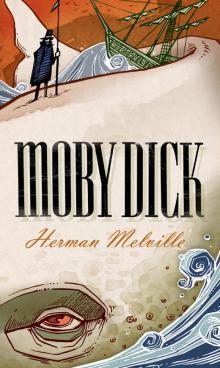 Moby Dick; Or, The Whale
Moby Dick; Or, The Whale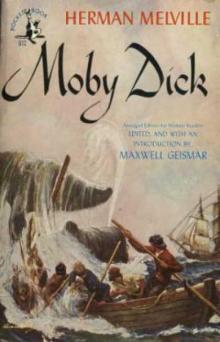 Moby Dick
Moby Dick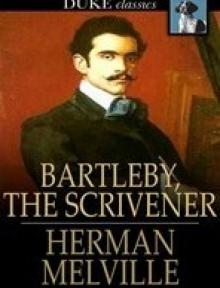 Benito Cereno and Bartleby the Scrivener
Benito Cereno and Bartleby the Scrivener Israel Potter: His Fifty Years of Exile (Annotated Edition)
Israel Potter: His Fifty Years of Exile (Annotated Edition) Billy Budd and the Piazza Tales
Billy Budd and the Piazza Tales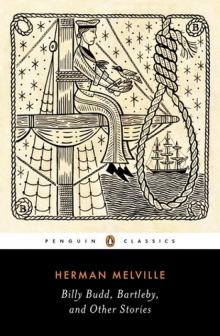 Billy Budd, Bartleby, and Other Stories
Billy Budd, Bartleby, and Other Stories Typee: A Romance of the South Seas
Typee: A Romance of the South Seas Omoo: Adventures in the South Seas
Omoo: Adventures in the South Seas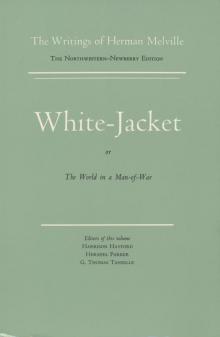 White Jacket; Or, The World on a Man-of-War
White Jacket; Or, The World on a Man-of-War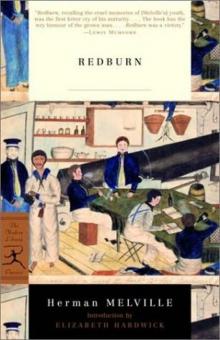 Redburn. His First Voyage
Redburn. His First Voyage Mardi: and A Voyage Thither, Vol. II
Mardi: and A Voyage Thither, Vol. II Typee
Typee The Paradise of Bachelors and the Tartarus of Maids
The Paradise of Bachelors and the Tartarus of Maids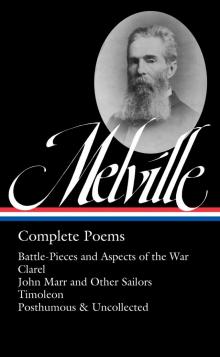 Herman Melville- Complete Poems
Herman Melville- Complete Poems Bartleby and Benito Cereno
Bartleby and Benito Cereno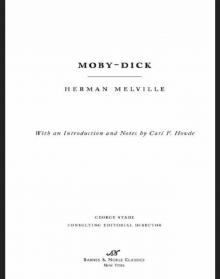 Moby-Dick (Barnes & Noble Classics Series)
Moby-Dick (Barnes & Noble Classics Series) Mardi and a Voyage Thither
Mardi and a Voyage Thither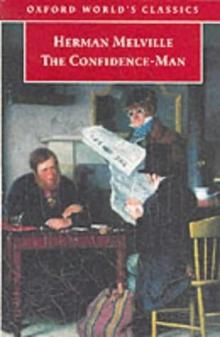 The Confidence-Man
The Confidence-Man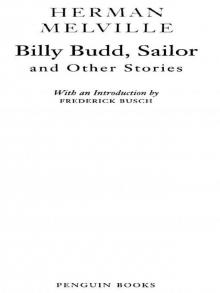 Billy Budd and Other Stories
Billy Budd and Other Stories Bartleby the Scrivener
Bartleby the Scrivener Typee: A Romance of the South Sea
Typee: A Romance of the South Sea I and My Chimney
I and My Chimney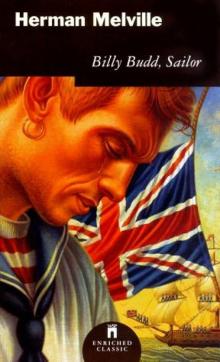 Billy Budd
Billy Budd Pierre, Or the Ambiguities
Pierre, Or the Ambiguities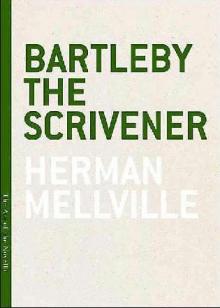 Bartleby, The Scrivener A Story of Wall-Street
Bartleby, The Scrivener A Story of Wall-Street Four Great American Classics
Four Great American Classics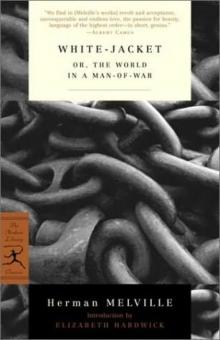 White Jacket or, The World on a Man-of-War
White Jacket or, The World on a Man-of-War The Piazza Tales
The Piazza Tales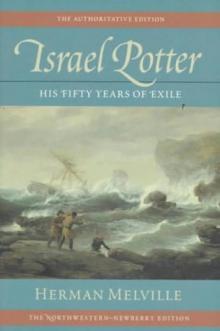 Israel Potter. Fifty Years of Exile
Israel Potter. Fifty Years of Exile